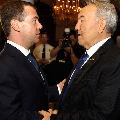
Moscow News reports on protests during Nazarbayev visit to Brussels
Below we publish an editorial from Moscow News, which reported on the protests around the visit of Kazakh President Nursultan Nazarbayev to Brussels, in which the CWI played a key role. Click here for further reports
People living in Russia are familiar with the well-practised arguments about whether the country should be described as a sovereign democracy or an authoritarian regime.
But two events this week relating to the European Union’s attitude towards one of Russia’s neighbours, Kazakhstan, create an altogether more shocking impression.
The most prominent event was the visit of Kazakh President Nursultan Nazarbayev to Brussels, where he was wined and dined by the head of the European Commission, Jose Manuel Barroso. Their meeting came in advance of the OSCE summit in Astana in December, where 55 heads of state will mark Kazakhstan’s presidency of the organisation. Barroso and Nazarbayev talked of the “partnership between the European Union and Kazakhstan – which is growing daily” and “strategic issues” such as “the critical field of energy”, the need for “an open investment climate” and Kazakhstan’s “accession to the WTO”.
Almost as afterthought, they discussed issues “related to political reforms and human rights”, according to an EU press statement.
The other event, a day before in Brussels, was a damning report to the European Parliament on the lack of democracy and human rights in the Central Asian country.
Ainur Kurmanov, a human rights activist and leader of the “Kazakhstan 2012” opposition bloc, detailed to the parliament’s human rights committee a catalogue of abuses, media censorship, torture in Kazakh prisons – and the fact that Nazarbayev just had himself declared leader for life. Following Kurmanov’s speech, the committee chair praised his testimony, saying he had “spoiled Nazarbayev’s party”.
Kurmanov, a veteran of campaigns to prevent poor Almaty residents having their homes bulldozed and to support trade unionists’ and prisoners’ rights, has several times been jailed by Nazarbayev’s government. The name “Kazakhstan 2012”, by the way, refers not simply to the opposition’s aim of ending Nazarbayev’s rule by that year, but the aspiration for there simply to be an election at all.
Unsurprisingly, Nazarbayev and oil grabbed the headlines, but human rights did not. Sadly, this shows the EU’s priorities: Yes, we want your oil, and no, we’re not going to complain about your dictatorship.
Oil for human rights? You bet.
Special financial appeal to all readers of socialistworld.net |
Support building alternative socialist media Socialistworld.net provides a unique analysis and perspective of world events. Socialistworld.net also plays a crucial role in building the struggle for socialism across all continents. Capitalism has failed! Assist us to build the fight-back and prepare for the stormy period of class struggles ahead. Please make a donation to help us reach more readers and to widen our socialist campaigning work across the world. |
Donate via Paypal |
| M | T | W | T | F | S | S |
|---|---|---|---|---|---|---|
| 1 | 2 | 3 | 4 | 5 | 6 | 7 |
| 8 | 9 | 10 | 11 | 12 | 13 | 14 |
| 15 | 16 | 17 | 18 | 19 | 20 | 21 |
| 22 | 23 | 24 | 25 | 26 | 27 | 28 |
| 29 | 30 | |||||


Be the first to comment